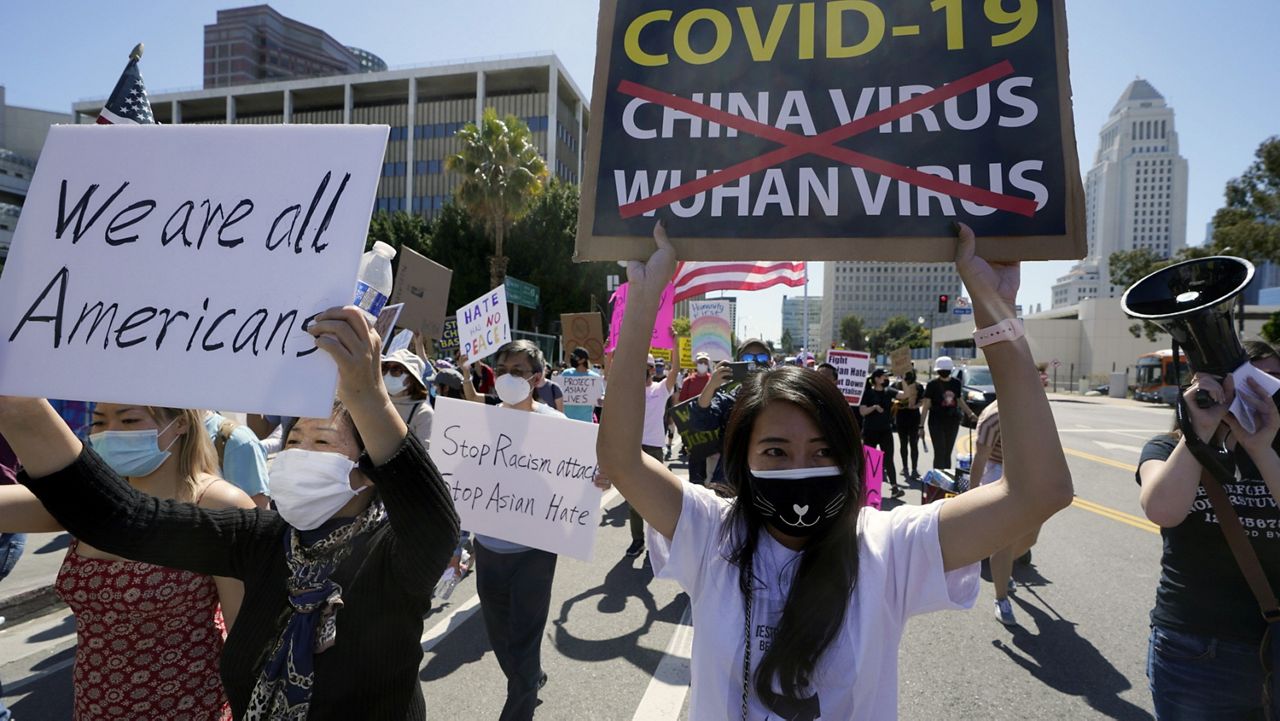Amid a rise of anti-Asian hate incidents nationwide, the Biden administration on Tuesday announced new actions that build on President Joe Biden's executive order aimed at combatting racism, xenophobia and violence against the Asian American and Pacific Islander (AAPI) community that he signed on his first week in office.
"DOJ is taking steps to strengthen hate crimes data reporting on AAPI violence, improve law enforcement training so that local law enforcement agencies can better identify Anti-Asian bias," White House press secretary Jen Psaki said at a press briefing Tuesday. "In the coming weeks, the administration will meet with AAPI leaders to hear their input on how we can play the most constructive role possible in the community."
The administration's actions include, according to the White House:
- Creating a Department of Justice cross-agency initiative devoted to addressing anti-Asian violence
- Establishing a COVID-19 Equity Task Force committee to address and end xenophobia against Asian Americans
- Allocating $49.5 million from the American Rescue Plan for AAPI survivors of domestic violence and sexual assault
- Restarting the White House Initiative on Asian Americans and Pacific Islanders, which will initially focus on anti-Asian violence and bias
"Too many Asian Americans have been walking up and down the streets and worrying, waking up each morning the past year feeling their safety and the safety of their loved ones are at stake," Biden said at a speech at Emory University on March 19 in the wake of a deadly series of shootings that killed eight, including six Asian women. "They’ve been attacked, blamed, scapegoated and harassed. They’ve been verbally assaulted, physically assaulted, killed.
"The conversation we had today with the AAPI leaders, and that we’re hearing all across the country, is that hate and violence often hide in plain sight," Biden said at the time. "And it’s often met with silence. That’s been true throughout our history, but that has to change — because our silence is complicity. We cannot be complicit. We have to speak out. We have to act."
"Across our nation, an outpouring of grief and outrage continues at the horrific violence and xenophobia perpetrated against Asian American communities, especially Asian American women and girls," the White House said in a statement. "As President Biden said during his first prime time address, anti-Asian violence and xenophobia is wrong, it’s un-American, and it must stop."
In several major cities, including New York and Los Angeles, police reported an uptick in Asian-targeted hate crimes between 2019 and 2020, according to data collected by the Center for the Study of Hate & Extremism at California State University, San Bernardino. And Stop AAPI Hate, a California-based group to which several companies have pledged donations, says it’s received reports of nearly 3,800 hate incidents — from verbal harassment to physical assault — since March 2020.
Many activists have argued that the rhetoric of former President Donald Trump, who repeatedly referred to COVID-19 as the “China virus” and “kung flu,” contributed to the increase in anti-Asian hate crimes. In the Georgia case, the shooting suspect, Robert Aaron Long, told investigators that the attacks were not racially motivated but were instead driven by a sex addiction.
For the past several weeks, Asian Americans have questioned how to deal with a recent wave of assaults — many on the elderly — that have coincided with the pandemic. The virus was first identified in China, and former President Donald Trump and others have used racial terms to describe it.
Numerous Asian American organizations say Trump’s rhetoric has emboldened people to express anti-Asian or anti-immigrant views. Nearly 3,800 incidents have been reported to Stop AAPI Hate, a California-based reporting center for Asian American Pacific Islanders, and its partner groups, since March 2020. Nationally, women reported hate crimes 2.3 times more than men.
According to a recently released study, the use of anti-Asian hashtags skyrocketed on Twitter last year in the days after then-President Donald Trump used the term “Chinese virus” for the first time in a tweet. According to Stop AAPI Hate, 3,795 hate incidents were reported to the advocacy group from March 19, 2020, to Feb. 28, 2021 — more than 600 of them from March 19 to 25, 2020.
Following the release of a report showing a surge in white supremacist propaganda in 2020, the Anti-Defamation League told The Associated Press that a significant amount of the propaganda included anti-immigrant rhetoric.
The anti-hate group said 10% of propaganda descriptions in its inventory contained negative references to immigration, multiculturalism or diversity. The 522 physical flyers, stickers or banners included the use of words such as “invasion, deport, disease, illegal, infection and virus,” the ADL said.
The Georgia attack was the sixth mass killing this year in the U.S., and was the deadliest since the August 2019 Dayton, Ohio, shooting that left nine people dead – until a shooting just days later at a grocery store in Boulder, Colorado, that left 10 dead.
Biden also called on Congress to pass the COVID-19 Hate Crimes Act, a bill that would require the Department of Justice to conduct an expedited review of hate crimes spurred by the coronavirus pandemic.
The Associated Press contributed to this report.



